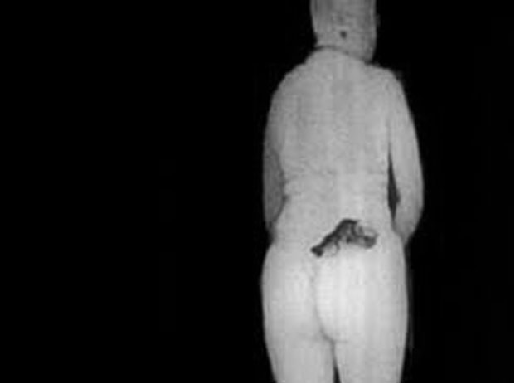|
Furthermore, if there is no capability for the devices to save, distribute and print images, then how on earth have news organizations obtained print outs of such images like the one above?
Journalists who researched trials of the technology reported that the images made genitals "eerily visible".
German Security advisor Hans-Detlef Dau, a representative for a company that sells the scanners, admits that the machines, "show intimate piercings, catheters and the form of breasts and penises".
Images on the TSA's own website produced by backscatter devices also show that genitals are visible.
As if it was needed, further circumstantial evidence also points to the fact that the images are actively being transmitted and printed in airports.
The claims that sensitive body parts will be blurred out is also bunkem. When they were first being installed, Australian authorities admitted that the machines don't work properly if sensitive areas of the body are blurred out - a fact that the British government later also admitted:
Cheryl Johnson, general manager of the Office of Transport Security, said:' It will show the private parts of people, but what we've decided is that we're not going to blur those out, because it severely limits the detection capabilities. '
The level of intimate detail captured by the scanners prompted the passage in the House last year of an amendment brought by Rep. Jason Chaffetz (R-Utah) to ban "strip-search" imaging at airports, a proposal he has reiterated his support for since the failed bombing attempt.
"You don't have to look at my wife and 8-year-old daughter naked to secure an airplane," Chaffetz said at the time.
"You can actually see the sweat on somebody's back. You can tell the difference between a dime and a nickel. If they can do that, they can see things that quite frankly I don't think they should be looking at in order to secure a plane," Chaffetz told the House.
Across the pond in Great Britain, the Equality and Human Rights Commission (EHRC) wrote a letter to the UK government recently warning that the use of the scanners constitutes a breach of privacy laws.
Multiple incidents over the past months have proven that the TSA and other airport security authorities worldwide have been engaging in a monumental public relations cover-up by suggesting the machine do not show crisp images of naked bodies.
In May it was reported that a TSA worker in Miami attacked a colleague who had made fun of his small penis after he passed through a scanner device. A similar controversy unfolded in March when an airport worker at Heathrow was caught ogling at a female colleague's breasts after she passed through one of the devices, commenting, "I love those gigantic tits".
Perhaps the most significant factor here, the smoking gun that proves the authorities have lied about the degree to which the scanners invade personal privacy, is their contradictory stated need for new "privacy sensitive" machines.
"With full body searches becoming the norm at airports amid terror threats, a Canadian engineer has invented a three-dimensional scanner that doesn't violate passengers' privacy." reported IBN Live in Toronto back in February.
"The new 3D scanner developed by Montreal-based William Awad highlights metal or organic material on a human body without showing the body outline under clothing, according to reports." the article continues.
"But the current scanners at airports produce a three-dimensional outline of the human body, raising a hue and cry over privacy violations."
The Canadian inventor of the new machine, currently seeking certification from the Transportation Security Administration (TSA) in the US, expects sales to balloon. But if we are to believe our governments' statements on the original scanning machines, there should be no need for any new privacy sensitive machine at all.
A recent article in The Boston Globe again highlights this point:
The TSA is working with technology companies to develop software that would show a generic paper-doll-like figure instead of an actual image of a passenger's body -- and transmit images only when a threat is detected.
The TSA plans to keep the current scanners in place until less invasive software is available.
This serves as an admission that, despite previous claims to the contrary, the scanners currently in place do indeed reveal detailed images of genitalia, they are in breach of child pornography laws and the images produced by them are tantamount to criminal evidence.
It highlights the fact that the public was once again grossly misled over the capabilities of the scanners now in place in airports the world over.
Furthermore, any "privacy sensitive" versions of the technology will not change a thing, as Marc Rotenberg, executive director of EPIC notes:
"This will not solve the privacy issues," Rotenberg said "because the images of travelers' naked bodies are still being captured by the machine."
.
|
|

